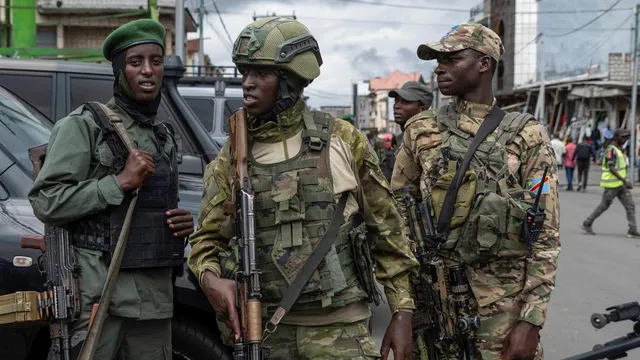
Congo's government and M23 rebels reach truce after Qatar peace talks
2025-04-24 12:39- Congo's government and M23 rebels held peace talks in Qatar, agreeing to work towards a truce.
- The joint statement was a significant shift as previous ceasefire commitments had not been successful.
- Reaching a truce is seen as a crucial step to ultimately ending the prolonged violence in eastern Congo.
Express your sentiment!
Insights
The conflict in eastern Congo has been ongoing for several decades and has escalated significantly since January 2023. During this period, the M23 rebels launched an unprecedented offensive, capturing key cities such as Goma and Bukavu. In response to rising violence and turmoil, a breakthrough occurred with peace talks taking place in Doha, Qatar, where both the Congolese government and the M23 rebels met to discuss terms for a ceasefire. In a joint statement released during the talks, both sides expressed their commitment to an immediate cessation of hostilities and pledged to work toward a truce. The joint commitment was particularly significant as previous unilateral ceasefire efforts had failed to hold, highlighting the fragile nature of peace in the region. The conflict has created one of the world's largest humanitarian crises, displacing over 7 million people and resulting in significant casualties since the beginning of the year. The United Nations has also implicated Rwanda in supporting the M23 rebels, adding an international dimension to the conflict. In light of these complexities, the recent agreement to halt fighting aims to allow for further discussions and negotiations to reach a more comprehensive peace accord. Delegations from both parties described their discussions as frank and constructive, which signifies a shift in attitudes that could potentially lead to an enduring solution to the conflict. As both sides reaffirm their commitment to peace, observers remain cautiously optimistic. However, the specter of past failed agreements looms large, making it crucial for both parties to uphold their promises and seek a long-term resolution to the ongoing violence in eastern Congo.
Contexts
The M23 rebellion in the Democratic Republic of the Congo (DRC) is a complex conflict that emerged from the country's prolonged political instability and ethnic tensions, especially in the eastern regions. The M23 movement, which stands for March 23, signifies its name from the date of the peace accord signed in 2009 between the Congolese government and a previous rebel group, the National Congress for the Defense of the People (CNDP). This accord failed to address the underlying grievances, leading to the resurgence of violence when former CNDP members formed the M23 group in April 2012. They claimed that the Congolese government had neglected its promises regarding integration of CNDP fighters and reforms to security sectors, prompting them to take up arms once again to demand their rights and protection for the Tutsi ethnic group, to which many of the rebels belong. The initial phase of the M23 rebellion was marked by significant military successes, as the group captured the city of Goma in November 2012. The rapid advance was facilitated by accusations of support from the Rwandan government, which allegedly provided logistical and military assistance to the M23 fighters, leading to widespread condemnation from the international community. The capture of Goma drew attention not just to the immediate conflict but also to the broader issues of regional dynamics, including the historic tensions between Rwanda and the DRC. Subsequent military intervention by the United Nations and the Congolese army led to a concerted effort to retake Goma, culminating in M23's withdrawal from the city in December 2012 and its official disbandment in 2013. Despite the end of major hostilities, the legacy of the M23 rebellion continues to affect the DRC's political landscape. Various factions remained active in eastern Congo, leading to ongoing instability and violence. Efforts to establish lasting peace have been complicated by the presence of numerous armed groups, local grievances, and the struggles for control over valuable mineral resources in the region. The Congolese government's inability to fully integrate former M23 members and address the root socio-economic issues has perpetuated cycles of violence and rebellion, highlighting the complex interplay between local and regional politics. In recent years, the situation in eastern DRC remained volatile, with sporadic clashes reported among various armed groups, including remnants of the M23. Diplomatic efforts to foster reconciliation and dialogue between conflicting parties have faced significant challenges, as distrust remains high among the involved factions. Additionally, the role of foreign actors, notably Rwanda, underscores the influence of external dynamics in this conflict. Continued international attention and support, alongside local empowerment strategies, are essential for achieving a sustainable resolution that addresses both the immediate security concerns and the long-term socio-economic needs of the affected populations in the DRC.